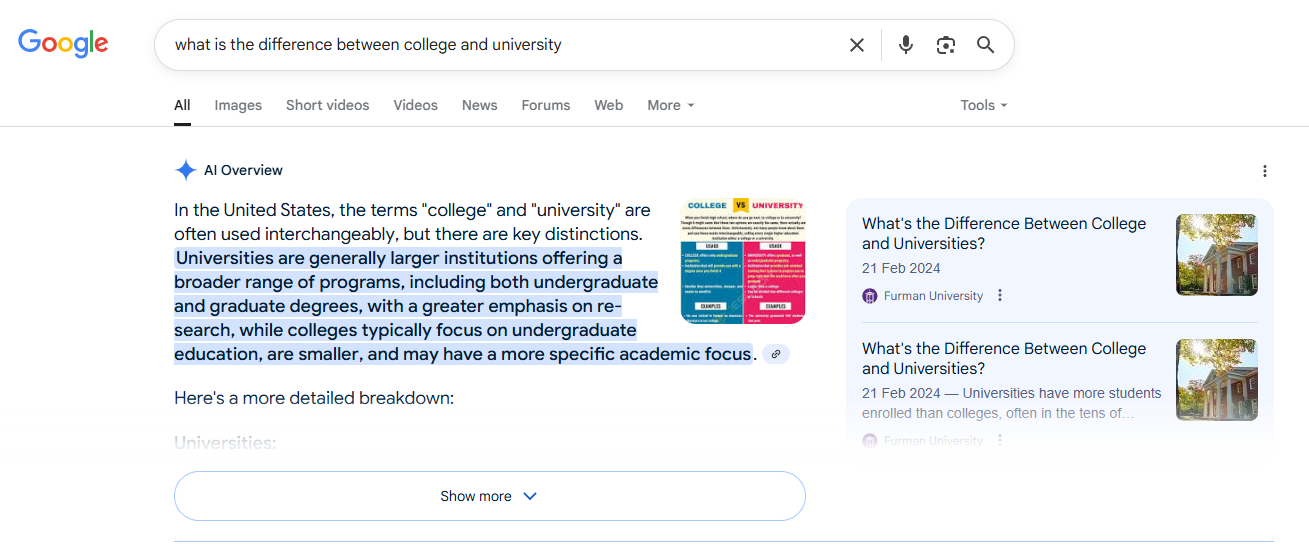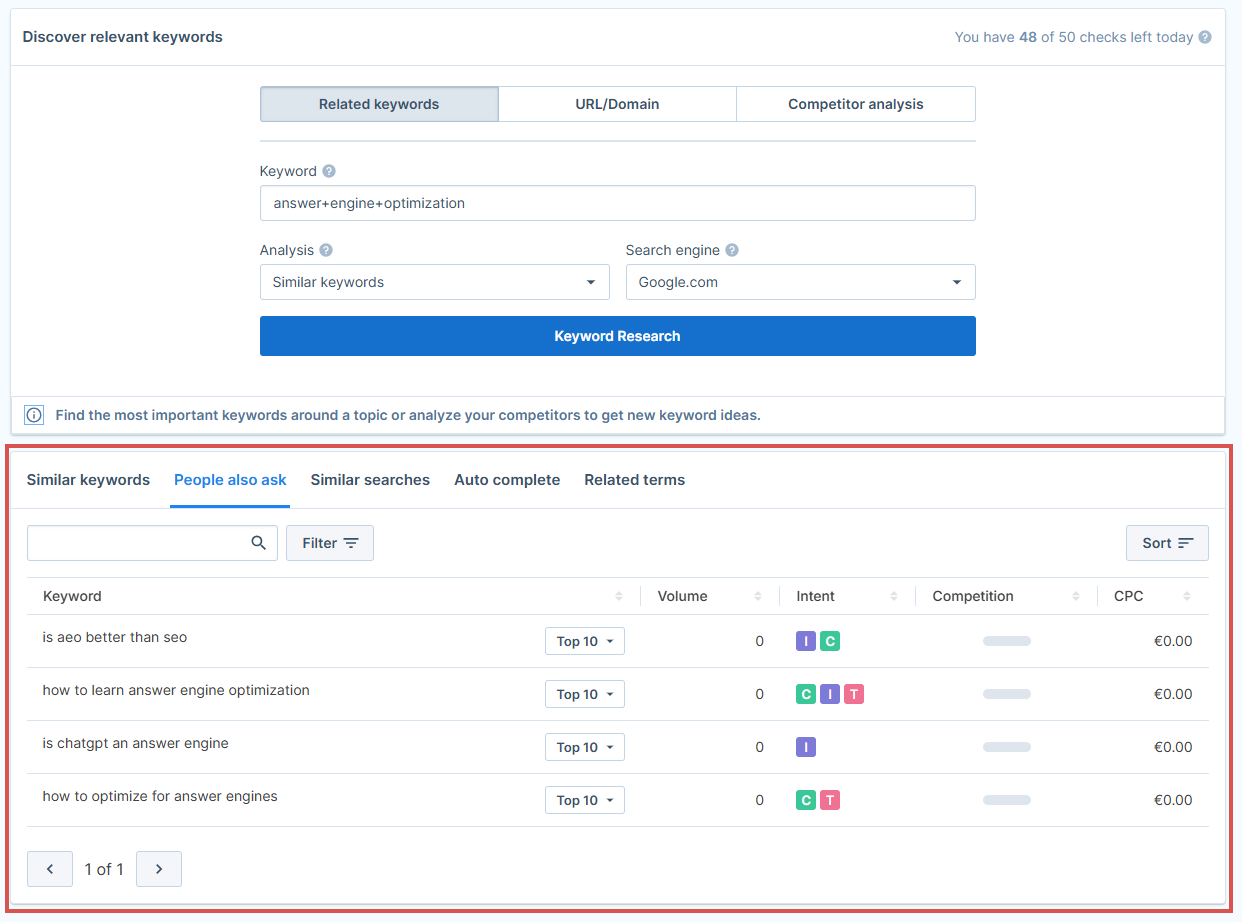What is Answer Engine Optimization?
Answer Engine Optimization (AEO) is the practice of creating and optimizing content to ensure it is easily discoverable by answer engines. These are systems, like Google’s AI Overviews, voice assistants (Alexa, Siri), or dedicated AI tools (ChatGPT, Bing Chat), that directly provide concise answers to user questions, rather than simply listing web pages as search results.
AEO ensures that your content appears prominently in these direct-answer formats, increasing your visibility and authority online.
AEO is sometimes discussed under alternative labels, such as generative-engine optimization (GEO), AI optimization (AIO), or chat-engine optimization (CEO), but all refer to the same underlying practice.[1]
How are answer engines different from search engines?
While traditional search engines usually show a list of links for users to click on, answer engines give quick and direct responses to questions, often without requiring users to click through to a website.
For example, when you ask Google a simple question like “How do you optimize for answer engines?”, the answer appears in an AI Overview box at the top, rather than (or in addition to) simply providing a list of websites.

| Traditional Search Engines | Answer Engines |
|---|---|
| Show a list of links to websites | Provide immediate, concise answers |
| Users typically click links for answers | Answers are often provided directly, without clicks |
| Focus on keyword matching | Focus on clear, factual, conversational answers |
Voice assistants, AI Overviews, and chat tools like ChatGPT use similar methods to understand user queries and find answers, relying on natural language processing and semantic systems like RankBrain.
What’s the difference between AEO and SEO?
While traditional Search Engine Optimization (SEO) focuses on helping web pages rank higher in search results through on-page and off-page SEO tactics, Answer Engine Optimization (AEO) specifically targets direct-answer formats. SEO aims to drive traffic through clicks, whereas AEO aims to position a brand directly in answer boxes, voice responses, or AI-generated answers without requiring clicks.
What are important factors for AEO?
To successfully optimize your content for answer engines, focus on these key factors:
- Clarity and simplicity: Provide short, clear, and direct answers (ideally under 50 words) to common questions surrounding the topic you write about.
- Structured data: Use structured data (schema markup) to help answer engines understand your content (e.g., FAQs, how-to steps, reviews).
- Entities & E-E-A-T: Clearly naming people, places, and concepts, and providing clear information about the author helps increase trust and visibility.
- Source authority & backlinks: Quality backlinks from trustworthy websites improve your credibility with both traditional and answer engines.
- Page experience: Ensure your pages load quickly, work well on mobile devices, and have clean HTML to help answer engines easily crawl your content.
- Matching conversational queries: Write content that matches the natural language of typical questions people ask.
How can you optimize your content for answer engines?
Here are clear, actionable steps you can follow to optimize your content for answer engines:
- Find relevant questions: Research common questions your audience asks using tools like Seobility’s Keyword Research Tool, your website’s internal search queries, or forums like Quora.

- Write concise answers: Clearly answer each question in one or two simple sentences immediately after a relevant subheading (e.g., an H2 or H3).
- Implement schema markup: Clearly mark content like FAQs, reviews, products, or how-to guides using schema.org structured data.
- Highlight entities clearly: Use unambiguous terms and link them to authoritative sources to improve clarity and accuracy (e.g., “Apple Inc.” instead of just “Apple”).
- Strengthen E-E-A-T signals: Regularly update your content, include author bios, and cite trustworthy sources to build credibility.
Why is AEO important for SEO, marketing, and your business?
More and more users are finding answers directly through answer engines, without visiting individual websites. Studies show that around 60% of searches end without a click to a website[2], as users often find what they need directly on the search results page. Additionally, Gartner predicts that 25 % of organic traffic will shift to AI chatbots and virtual agents by 2026[3].
Brands that ignore AEO risk disappearing from these “zero-click” experiences, even if their classic SEO remains strong.
Optimizing your content for these answer engines helps you:
- Gain visibility even without traditional clicks.
- Stay ahead of competitors who haven’t optimized for these new platforms.
- Influence potential customers by providing trustworthy, quick answers that mention your product or service.
How to measure AEO success
To understand how well your content is optimized for answer engines, you can track these metrics:
- AI and chatbot mentions: Regularly check if AI tools cite your content as a source of information or mention your product.
- Brand impact: Look for increases in searches for your brand name, direct website visits, or indirect conversions influenced by your answers.
- Check referral traffic from AI tools: Monitor conversions that result from it in website analytics tools like Google Analytics.
References
- Search Engine Journal
- Sparktoro – Zero-click search study 2024
- Gartner – Search traffic prediction 2026
Related links
- Seobility’s Answer Engine Optimization (AEO/GEO) Tools
- https://cxl.com/blog/answer-engine-optimization-aeo-the-comprehensive-guide-for-2025/
- https://developers.google.com/search/docs/appearance/structured-data/intro-structured-data
